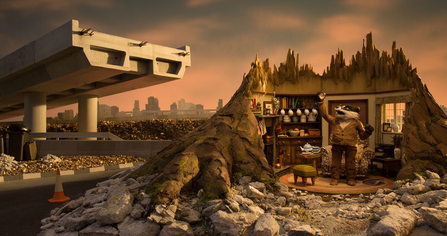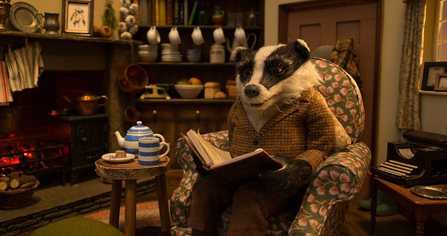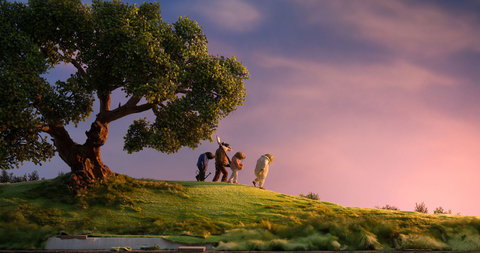Badger, Ratty, Mole and Toad strike out for a wilder future in Surrey
© The Wildlife Trusts
It's not too late to bring our wildlife back
Sir David Attenborough, Stephen Fry, Catherine Tate, Alison Steadman and Asim Chaudhry have backed a new campaign from The Wildlife Trusts that calls for a wilder future and for nature’s recovery in the UK.
The conservationist and actors have starring roles in a new The Wind in the Willows film trailer which brings to life the 21st century threats facing the much-loved characters from Kenneth Grahame’s children’s classic. The animated trailer calls on everyone to help bring our wildlife back before it’s too late, so that we can all enjoy a wilder future.
The film trailer reflects a reality we have seen in Surrey, where the lives of Badger, Ratty, Mole and Toad are disrupted by roads, river pollution and intensive agriculture – many habitats have been destroyed and others have been fragmented. This is why the Surrey Wildlife Trust’s new strategy is to restore Nature Recovery Networks across Surrey, where wildlife can live without being at risk of threats and extinction.
Kenneth Grahame wrote The Wind in the Willows just over a hundred years ago. Since then, many of the UK’s wild places and the plants and animals that depend on them have been lost. The State of Surrey’s Nature by Mike Waite, Living Landscapes Manager for Surrey Wildlife Trust, reports that 42 per cent of vertebrates including birds, reptiles, mammals, amphibians and fresh water fish are either extinct, threatened with extinction or in decline in Surrey. The River Wey, River Mole and other wetlands are in deep trouble with 40 per cent of extinct species in Surrey being from these wetland habitats.
Kenneth Grahame’s Ratty – the water vole – is the UK’s most rapidly declining mammal and despite intensive surveys in Surrey it is still unclear if any populations of water voles remain in the county. It is presumed extinct. Toad is also finding that times are very tough: he has lost nearly 70% of his own kind in the last 30 years alone – and much more than that in the last century.
These losses have led to the UK becoming one of the most nature-depleted countries in the world. Over the past ten years there have been numerous reports and studies documenting wildlife declines in the UK.
The main problems for wildlife are:
- Habitat loss – mostly caused by intensive farming, inappropriate development and lack of strategic planning, with the few remaining wild places being broken up by roads.
- Climate change – which is making a bad situation worse by causing extreme weather. This disrupts breeding patterns, threatens life cycles and creates food shortages. Wildlife cannot always keep up with changes to the seasons.

Sarah Jane Chimbwandira, CEO of Surrey Wildlife Trust, says:
“Many people move to Surrey because they love the convenience of commuting to work and living within a beautiful county, with leafy neighbourhoods, iconic woodland views from the Surrey Hills and peaceful riverside walks. Yet the pressure on Surrey’s nature means wildlife is in huge decline. If we want to put nature into recovery we have to create a mass movement of people calling for change in our county and across the UK. The Wildlife Trust film is a sad version of The Wind in the Willows – showing how Ratty and Toad have hit the buffers – but it’s not too late to save them in Surrey. We can create strong laws to establish a Nature Recovery Network, which will enable a wilder future and help nature make a comeback.”
The Wildlife Trusts hope The Wind in the Willows film trailer will inspire people to help nature by:
Contacting politicians – to call for strong environmental laws which help nature recover.
Walking in the pawprints of others – and imagine what wildlife needs to survive in your neighbourhood. Be inspired to take action for wildlife in your garden or local area, working with friends, neighbours – or by getting your local council involved – to create new homes for Toad, Ratty, Badger and friends.
Creating a Wilder Future where you live – by checking out the latest events and volunteering opportunities with Surrey Wildlife Trust atwww.surreywildlifetrust.org.uk to discover what a Wilder Future could look like – and the part everyone can play in making it happen.

© The Wildlife Trusts
What the star cast have to say
Stephen Fry, President of the Great Fen, Wildlife Trust Bedfordshire, Cambridgeshire and Northamptonshire:
“I’ve acted in and narrated Wind in the Willows in the past but this version is different – it really, really matters. I adore what’s left of Britain’s wild and precious places and I’m a passionate supporter of my local Wildlife Trust which is restoring a huge part of the fens for nature. We all need to get behind The Wildlife Trusts, rise up and call for a wilder future – otherwise it’ll be too late to save Toad, Ratty and all the residents of the riverbank and beyond.”
Alison Steadman, Olivier Award winner & ambassador for London Wildlife Trust, who plays Mole:
“The decline in UK habitats since Kenneth Grahame’s wonderful tale is truly shocking. Millions of people in the UK profess a love of wildlife and we need everyone to be taking action to bring about nature's recovery. I wanted to take part in this film to help inspire people to get involved and bring our nature back.”
Asim Chaudhry, comedian and actor, who plays Toad:
“Like many people in the UK, I’m shocked by the decline in our wildlife – but this film shows we can reverse this if we all take action now.”
President Emeritus of The Wildlife Trusts, Sir David Attenborough:
“It is desperately sad that so much of our country’s wildlife has been lost since Kenneth Grahame wrote his wonderful book The Wind in the Willows. Of all the characters in the book it is hard to know whose descendants have suffered the most. Water Voles, Toads and Badger’s friends in the book, Hedgehogs, have all seen catastrophic declines.
“Ratty was a Water Vole and these animals can’t burrow into river banks covered with sheets of metal. Toads need ponds and wet areas to lay their eggs. Hedgehogs must roam miles to feed at night but often hit barriers and struggle to find the messy piles of leaves they need for shelter. None of these creatures can cope with road traffic because they did not evolve to recognise a car as dangerous.
“We have damaged our rivers, built too many roads and lost too many ponds and meadows. All of this has happened because our systems and laws that should be keeping nature healthy are failing, and we are losing touch with wildlife. Everything is becoming disconnected.
“The Wildlife Trusts have worked tirelessly to slow wildlife’s decline and to save our remaining wild places. Without The Wildlife Trusts our country would be the poorer. But there is much more to be done. This country of nature lovers needs to give its wildlife every chance to survive, thrive and expand its range.
“I am backing The Wildlife Trusts’ campaign to rally people to secure a ‘wilder future’ by restoring large areas of wildlife habitat, in city and country. What we create may not look exactly like the countryside that Kenneth Grahame drew such inspiration from, but our wildlife won’t mind just so long as it has the places it needs to live and thrive.
“As a society we know how to put meanders back into straightened rivers and how to build bridges for wildlife. We know which wild places we should be protecting and expanding. But we need ambitious new laws to ensure we do this, laws that ensure we map out nature’s recovery.
“Meanwhile we can all make a practical difference. If you have a window sill or balcony you can put up bird feeders or plant pots of wildflowers. If you have a garden it is easy to dig a small pond or make holes in your fence for hedgehogs to wander through. It is not too difficult to take up paving slabs to let plants grow to feed our bees.
“Together we can make the next chapter for wildlife a happier one. Join us to put nature into recovery.”

© The Wildlife Trusts
